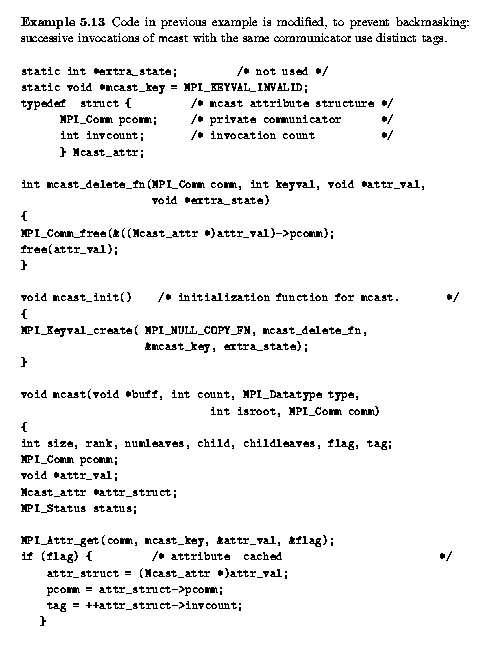
MPI provides the following services related to caching. They are all process local.

MPI_Keyval_create(MPI_Copy_function *copy_fn, MPI_Delete_function *delete_fn, int *keyval, void* extra_state)
MPI_KEYVAL_CREATE(COPY_FN, DELETE_FN, KEYVAL, EXTRA_STATE, IERROR)EXTERNAL COPY_FN, DELETE_FN
INTEGER KEYVAL, EXTRA_STATE, IERROR
MPI_KEYVAL_CREATE allocates a new attribute key value. Key values are unique in a process. keyattribute, key Once allocated, the key value can be used to associate attributes and access them on any locally defined communicator. The special key value MPI_KEYVAL_INVALID is MPI_KEYVAL_INVALID never returned by MPI_KEYVAL_CREATE. Therefore, it can be used for static initialization of key variables, to indicate an ``unallocated'' key.
The copy_fn function is invoked when a communicator is duplicated by MPI_COMM_DUP. copy_fn should be callback function, copy of type MPI_Copy_function, which is defined as follows:
typedef int MPI_Copy_function(MPI_Comm oldcomm, int keyval,
void *extra_state, void *attribute_val_in,
void *attribute_val_out, int *flag)
A Fortran declaration for such a function is as follows:
SUBROUTINE COPY_FUNCTION(OLDCOMM, KEYVAL, EXTRA_STATE, ATTRIBUTE_VAL_IN, ATTRIBUTE_VAL_OUT, FLAG, IERR)INTEGER OLDCOMM, KEYVAL, EXTRA_STATE, ATTRIBUTE_VAL_IN, ATTRIBUTE_VAL_OUT, IERR
LOGICAL FLAG
Whenever a communicator is replicated using the function MPI_COMM_DUP, all callback copy functions for attributes that are currently set are invoked (in arbitrary order). Each call to the copy callback is passed as input parameters the old communicator oldcomm, the key value keyval, the additional state extra_state that was provided to MPI_KEYVAL_CREATE when the key value was created, and the current attribute value attribute_val_in. If it returns flag = false, then the attribute is deleted in the duplicated communicator. Otherwise, when flag = true, the new attribute value is set to the value returned in attribute_val_out. The function returns MPI_SUCCESS on MPI_SUCCESS success and an error code on failure (in which case MPI_COMM_DUP will fail).
copy_fn may be specified as MPI_NULL_COPY_FN or MPI_DUP_FN from either C or FORTRAN. MPI_NULL_COPY_FN is a function that does nothing other than returning flag = 0 and MPI_SUCCESS; I.e., the attribute is not copied. MPI_DUP_FN sets flag = 1, returns the value of attribute_val_in in attribute_val_out and returns MPI_SUCCESS. I.e., the attribute value is copied, with no side-effects.
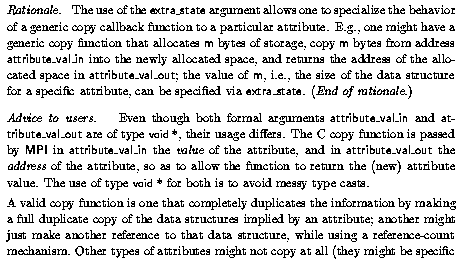

Analogous to copy_fn is a callback deletion function, defined as follows. The delete_fn function is invoked when a communicator is callback function, delete deleted by MPI_COMM_FREE or by a call to MPI_ATTR_DELETE or MPI_ATTR_PUT. delete_fn should be of type MPI_Delete_function, which is defined as follows:
typedef int MPI_Delete_function(MPI_Comm comm, int keyval,
void *attribute_val, void *extra_state);
A Fortran declaration for such a function is as follows:
SUBROUTINE DELETE_FUNCTION(COMM, KEYVAL, ATTRIBUTE_VAL, EXTRA_STATE, IERR)INTEGER COMM, KEYVAL, ATTRIBUTE_VAL, EXTRA_STATE, IERR
Whenever a communicator is deleted using the function MPI_COMM_FREE, all callback delete functions for attributes that are currently set are invoked (in arbitrary order). In addition the callback delete function for the deleted attribute is invoked by MPI_ATTR_DELETE and MPI_ATTR_PUT. The function is passed as input parameters the communicator comm, the key value keyval, the current attribute value attribute_val, and the additional state extra_state that was passed to MPI_KEYVAL_CREATE when the key value was allocated. The function returns MPI_SUCCESS on success and an error code on failure (in which case MPI_COMM_FREE will fail).
delete_fn may be specified as MPI_NULL_DELETE_FN from either C or FORTRAN; MPI_NULL_DELETE_FN is a function that does nothing, other than returning MPI_SUCCESS.

MPI_KEYVAL_FREE(keyval) INOUT keyval Frees the integer key valueMPI_Keyval_free(int *keyval)
MPI_KEYVAL_FREE(KEYVAL, IERROR)INTEGER KEYVAL, IERROR
MPI_KEYVAL_FREE deallocates an attribute key value. This function sets the value of keyval to MPI_KEYVAL_INVALID. Note MPI_KEYVAL_INVALID keyattribute, key that it is not erroneous to free an attribute key that is in use (i.e., has attached values for some communicators); the key value is not actually deallocated until after no attribute values are locally attached to this key. All such attribute values need to be explicitly deallocated by the program, either via calls to MPI_ATTR_DELETE that free one attribute instance, or by calls to MPI_COMM_FREE that free all attribute instances associated with the freed communicator.

MPI_Attr_put(MPI_Comm comm, int keyval, void* attribute_val)
MPI_ATTR_PUT(COMM, KEYVAL, ATTRIBUTE_VAL, IERROR)INTEGER COMM, KEYVAL, ATTRIBUTE_VAL, IERROR
MPI_ATTR_PUT associates the value attribute_val with the key keyval on communicator comm. If a value is already associated with this key on the communicator, then the outcome is as if MPI_ATTR_DELETE was first called to delete the previous value (and the callback function delete_fn was executed), and a new value was next stored. The call is erroneous if there is no key with value keyval; in particular MPI_KEYVAL_INVALID is an erroneous value for keyval. MPI_KEYVAL_INVALID

MPI_Attr_get(MPI_Comm comm, int keyval, void *attribute_val, int *flag)
MPI_ATTR_GET(COMM, KEYVAL, ATTRIBUTE_VAL, FLAG, IERROR)INTEGER COMM, KEYVAL, ATTRIBUTE_VAL, IERROR
LOGICAL FLAG
MPI_ATTR_GET retrieves an attribute value by key. The call is erroneous if there is no key with value keyval. In particular MPI_KEYVAL_INVALID is an erroneous value for keyval. On the other hand, the call is correct if the key value exists, but no attribute is attached on comm for that key; in such a case, the call returns flag = false. If an attribute is attached on comm to keyval, then the call returns flag = true, and returns the attribute value in attribute_val.
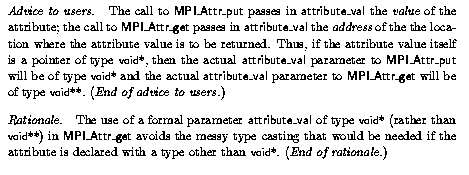

MPI_Attr_delete(MPI_Comm comm, int keyval)
MPI_ATTR_DELETE(COMM, KEYVAL, IERROR)INTEGER COMM, KEYVAL, IERROR
MPI_ATTR_DELETE deletes the attribute attached to key keyval on comm. This function invokes the attribute delete function delete_fn specified when the keyval was created. The call will fail if there is no key with value keyval or if the delete_fn function returns an error code other than MPI_SUCCESS. On the other hand, the call is correct even if no attribute is currently attached to keyval on comm.
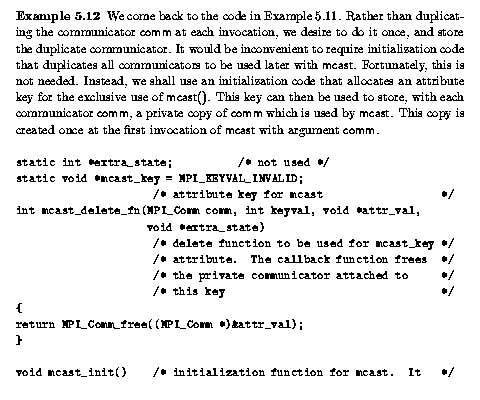
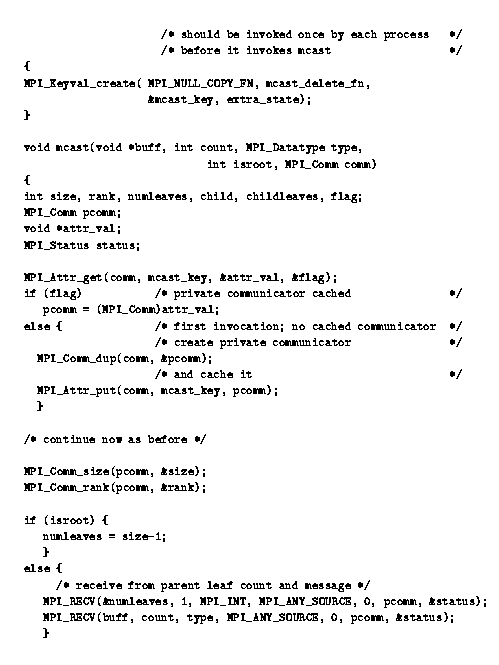
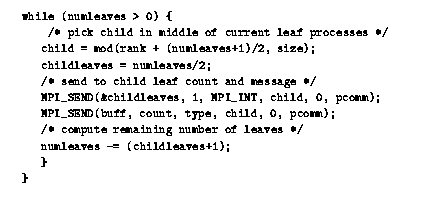
The code above dedicates a statically allocated private communicator for the use
of mcast. This segregates communication within the library from
communication outside the library. However, this approach does not provide
separation of communications belonging to distinct invocations of the same
library function, since they all use the same communication domain. Consider
two successive collective invocations of mcast by four
processes, where process 0 is the
broadcast root in the first one, and process 3 is the root in the second one.
The intended execution and communication flow for these two invocations is
illustrated in Figure ![]() .
.

Figure: Correct execution of two successive invocations of mcast
However, there is a race
between messages sent by
the first invocation of mcast, from process 0 to process 1,
and messages sent by the second invocation of mcast,
from process 3 to process 1. The erroneous execution illustrated in
Figure ![]() may occur, where messages sent by second
invocation overtake messages from the first invocation.
This phenomenon is known as backmasking.
backmasking
may occur, where messages sent by second
invocation overtake messages from the first invocation.
This phenomenon is known as backmasking.
backmasking
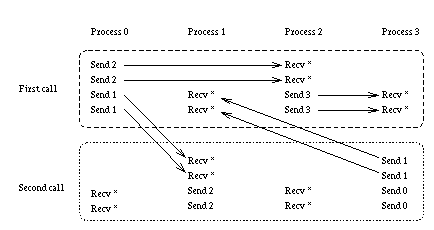
Figure: Erroneous execution of two successive invocations of mcast
How can we avoid backmasking? One option is to revert to the approach in
Example ![]() , where a separate communication domain is generated
for each invocation. Another option is to add a barrier
synchronization, either
at the entry or at the exit from the library call. Yet another option is to
rewrite the library code, so as to prevent the nondeterministic race. The
race occurs because
receives with dontcare's are used. It is often possible to
avoid the use of such constructs. Unfortunately, avoiding dontcares leads to a
less efficient implementation
of mcast. A possible alternative is to use increasing tag numbers to
disambiguate successive invocations of mcast.
An ``invocation count''
can be cached with each communicator, as an additional library attribute.
The resulting code is shown below.
, where a separate communication domain is generated
for each invocation. Another option is to add a barrier
synchronization, either
at the entry or at the exit from the library call. Yet another option is to
rewrite the library code, so as to prevent the nondeterministic race. The
race occurs because
receives with dontcare's are used. It is often possible to
avoid the use of such constructs. Unfortunately, avoiding dontcares leads to a
less efficient implementation
of mcast. A possible alternative is to use increasing tag numbers to
disambiguate successive invocations of mcast.
An ``invocation count''
can be cached with each communicator, as an additional library attribute.
The resulting code is shown below.
